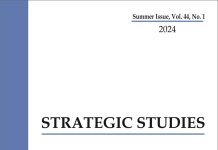Abstract
The decision by the Pakistani leadership to unconditionally support the US in its war on terror after the 9/11 attacks has had long-term consequences. Now that the US intervention in Afghanistan is rapidly moving towards its denouement, the implications have become painfully clear. At the time the decision was made, the prevalent environment dictated the government of Pakistan to act quickly in favour of the USA. To defy the US would have meant grave consequences. Pakistan lacked the means and resources to chart an independent path. In this atmosphere of overwhelming coercion and fear, the only rational choice was total and complete cooperation. The government of Pakistan chose to unconditionally side with the US. This paper argues that the decision-making process is short-circuited when a single person is calling the shots, and the long-term consequences can be less than satisfactory. A multi-layered decision-making process not only buys time for the decision makers, but it also makes for greater responsibility and reduces the negative fallout to a large extent. A holistic response requires greater participation from all stakeholders. It also needs courage and imagination on the part of all concerned parties. An extraordinary situation must be thought through in great detail before making a strategic commitment.












